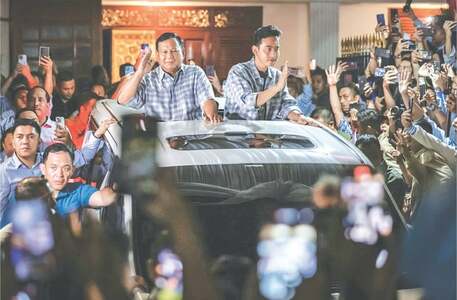
JAKARTA: Former general Prabowo Subianto was sworn in on Sunday as president of Indonesia, seeking a more prominent position on the global stage for the world’s fourth most populous nation.
The 73-year-old fiery nationalist — accused of rights abuses during his time in the military — took the oath at parliament to officially succeed outgoing leader Joko Widodo.
“We will lead the Indonesian government… by prioritising the interests of all Indonesian people, including those who did not vote for us,” he said, pledging to tackle corruption and protect democracy.
Cabinet of ministers
After his swearing-in, he also announced his cabinet of ministers, naming Sugiono, as new foreign minister. Rosan Perkasa Roeslani returned as investment minister and Sri Mulyani Indrawati and Erick Thohir kept their respective portfolios of finance and state-owned enterprises.
The former general has committed himself to Indonesia’s non-aligned foreign policy
Prabowo has committed himself to Indonesia’s non-aligned foreign policy, but has signalled that he will be bolder on the world stage.
He made China his first foreign visit after his election eight months ago, before embarking on trips to a dozen other countries including Russia and Australia, where he signed a key security deal.
Prabowo won by a first-round landslide in the February vote, helped by the support of running mate Gibran Rakabuming Raka, the 37-year-old son of Widodo.
After his swearing-in, the former defence minister, dressed in traditional attire, addressed lawmakers who chanted his name.
“We want to be the good neighbour,” he said.“We don’t want to disturb other countries, but we will not let any countries disturb us.”
Prabowo then went to the presidential palace in Jakarta, shaking hands with supporters before a handover ceremony with former rival Widodo, more popularly known as Jokowi, to whom he lost two elections.
Diplomats attend inauguration
Several dozen diplomats attended the inauguration, including Singapore Prime Minister Lawrence Wong, Philippine President Ferdinand Marcos Jr, British Foreign Minister David Lammy and Chinese Vice President Han Zheng.
Chinese President Xi Jinping sent a congratulatory message on Sunday, saying he would maintain “close strategic communication” with Prabowo, state broadcaster CCTV said.
Tens of thousands lined the streets of Jakarta amid heightened security as Prabowo became Indonesia’s eighth leader since the country achieved independence in 1945.
“I hope that the vision and mission that they have created can be implemented, prioritising the welfare of the people,” said Calissa Putri, a 20-year-old student, of Prabowo and Gibran.
NGOs and his former military bosses accuse Prabowo of ordering the abduction of democracy activists at the end of dictator Suharto’s rule in the late 1990s.
Prabowo was discharged from the military over the abductions, but denied the allegations.
The United States and Australia have refused in the past to give Prabowo a visa because of his rights record but he has visited both countries in recent years.
Image reboot
A campaign to rehabilitate Prabowo’s reputation won over younger voters in the last election, with the former general remodelling himself as a grandfatherly figure.
The addition of Gibran to the ticket prompted accusations of nepotism after age limits for candidates were lowered last year by Jokowi’s brother-in-law, then the chief justice.
Gibran’s popularity is tied to his father, who took Indonesia out of the Covid-19 pandemic relatively unscathed and back to five per cent growth.
Jokowi’s successor has set an even higher target of eight per cent growth. But experts say a bigger challenge lies ahead on the world stage.
“He will have to navigate inevitable tension between his country’s extensive economic relationship with China and growing security relationships with the United States and Australia,” said Novak.
Published in Dawn, October 21st, 2024















































Dear visitor, the comments section is undergoing an overhaul and will return soon.